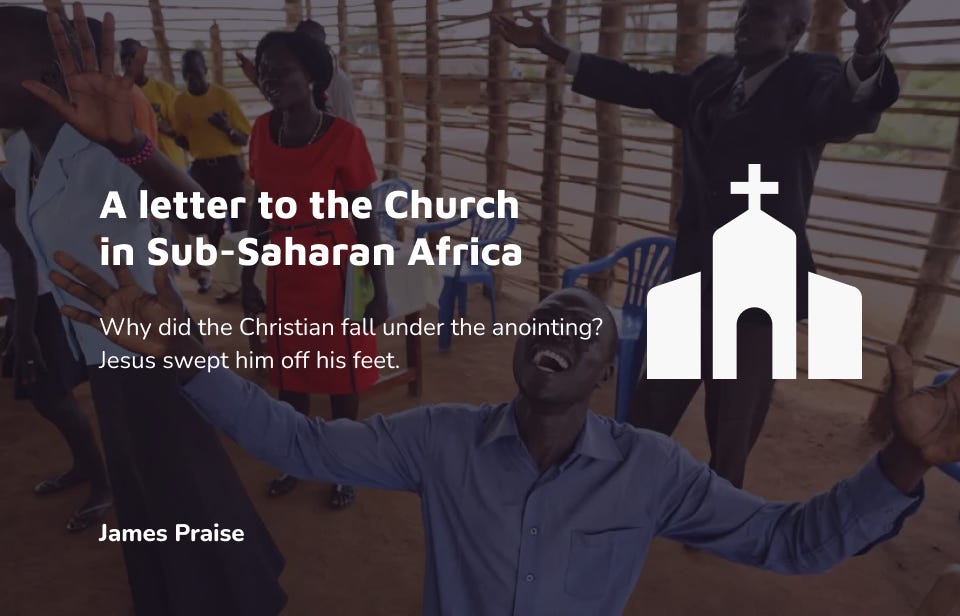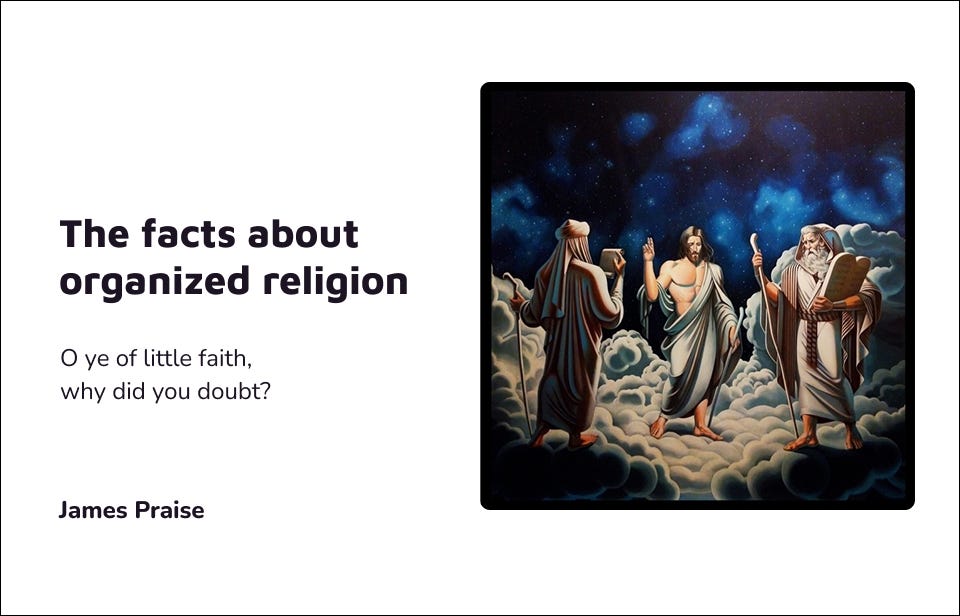A Letter to the Church in Sub-Saharan Africa
Why did the Christian fall under the anointing? Jesus swept him off his feet.
Wake up. No one is coming to save you. You need to save yourself.
A lot of people never get a choice to decide on religious practices and beliefs, as they were thrown into them from birth.
You are born into a world where your religious beliefs were pre-selected for you, just like a default setting on a gadget. No critical thinking needed, no menu to choose from, just straight into the faith package that was decided before you even uttered your first baby babble.
No one is coming to save you
Men of God capitalize on the systemic problems of leadership and government, to sell faith and hope to save the masses, and the people continuously pay to be members of this community — the church.
It’s like a club where entry is free but you have to pay for drinks nonetheless. You have to pay tithes, offerings, seeds, first fruits, donations, and whatnot, to continue to drink from the cup of the spirit and be intoxicated by the holy ghost. Why are we paying so much if Jesus already paid the price?
Politicians rightly recognize how much of an influence religion, tribe, and culture have on people and that is why you see them pulling ceremonious stunts in places of worship during election times.
Religious leaders (especially pastors) encourage the people to pray and fast for their country and government to change for the better. But, they do not lead meaningful initiatives that can drive tangible outcomes. What did the Bible say about faith without works? It died, it is dead, and it is still dying! James 2:14–26.
You should encourage your congregation to vote during elections. Get them vying for political positions so they also can be the change they want to see in the world. Encourage them to drive policy changes and challenge the status quo. That’s how a nation will get better.
The Israelites did not get to the promised land by prayers, fasting, faith, and prophecy alone. They were warriors. They were violent (I am not an advocate for violence of any form). And they took it by force. Matthew 11:12.
Israel is still taking lands by force to this day. Do you know about the Israel-Palestine conflict?
Misleading, misdirecting, and manipulative
I have been to several churches. One too many churches. More than I can count.
I spent most of my formative years in the fire ministry where we would pray many culturally-influenced prayers, and we would shake our heads vehemently as if the intentions were to break our necks or decapitate ourselves.
“Powers of my father’s and mother’s house that are working against my destiny. Fall down and die.”
Making you believe that you have little to no control over the outcomes of your life and your immediate environment because your father and mother’s household are invested in seeing you fail.
I would argue that this is a mindset problem. You did not fail JAMB four times because some decrepit old grand-aunt has been chanting incantations in some village somewhere, holding your picture and blowing powder against your retentive memory. You just did not have the right information and resources on how to pass the exams.
There is nothing spiritual about a lot of things. At least not in the way many men of God make you think about it.
“O Lord connect me to my divine helper!”.
“You my divine helper locate me by fire!”.
What is problematic about these prayer points is the misdirection of thought and efforts.
If you want to connect with the right people, you have to do the work. Go out and meet people. Attend events. Join communities. Invest in networking.
“Every Satanic mortar, pounding my destiny, catch fire!”
So when things do not work out for you in life, you will not take responsibility for the part you had to play in that. You think you do not have agency over your outcomes. You would resort to blaming everyone and everything else but yourself, including mystical things that you cannot control.
The universe is based on laws and principles. Even the Bible talks about there being a time for everything. Eccl 3:1–8. The same Bible talks about diligence at work. Prov 22:29, and Prov 18:16.
Jesus even took his time to explain the concept of work and outcomes with the parable of talents. Matthew 25:14–30. I could go on and on and on.
The Prophetic — Thus saith the Lord!
Should we talk about our prophets? How they see the future for religious followers, and then make them pay “seeds” to either secure a favorable outcome in faith or avert a foretold danger. Ridiculous! I have met too many of you. Get thee behind me Satan!
Pastor, prophet, apostle, bishop, reverend, elder of the highest. Man of God with a hotline to the divine, ready to offer you an inside scoop on your future — for a small fee, of course. They divine your destiny and then, oh-so-kindly, offer to tweak it a bit if you just sow a seed or two. Not the seeds you plant in your garden, mind you, but the ones you’re supposed to sow into the fertile soil of a prophet’s bank account or the church. These seeds have the miraculous power to transform your life, steering it away from perilous pitfalls or rocketing it toward the heavenly highway of success. And all it takes is your debit card, a prayer, and a sprinkle of holy water. It is well with your soul.
Let’s not forget the dramatic predictions. A well-timed, “January 2024 new-year prophecy”. Beware!
Not everything labeled ‘spiritual’ is from above
Religious leaders understand this perfectly. They invest heavily in the choir because they know the power of music on the human psyche.
Gospel music isn’t necessarily summoning the spirit of God like some divine DJ spinning celestial tunes. No, it’s about invoking emotions, tapping into feelings, and creating an atmosphere that makes you believe you’ve encountered the divine. The choir belts out those harmonies, the congregation sways, and suddenly, it’s the ‘move of the spirit.’
Why do we have “worldly” songs that seem soul-lifting and spirit-filling? It is an effect that can be engineered by rhythm.
Why did the Christian fall for Jesus? He swept him off his feet!
Falling under the anointing is often described as a powerful, spiritual experience where you feel overwhelmed by the presence of a divine force, typically during religious services or ceremonies. This therefore leads to a sudden loss of physical control.
Picture this — someone, usually guided by the pastor’s touch or prayer, starts swaying, trembling, and before you know it, gravity wins the battle, and down they go — metaphorically catching some spiritual waves.
Now, some see this as a profound encounter with the divine, a moment where they feel an overwhelming surge of spirituality. Others, however, might question if it’s more about the power of suggestion than a genuine touch from the heavens.
It’s a bit like an unplanned trust fall exercise in the middle of a religious service. You’re counting on the anointing to catch you, quite literally, and hoping for that divine safety net to break your fall.
And let’s not forget the recovery process! After this spiritual nose-dive, there’s usually a team of church volunteers or ushers ready to catch you, wrap you in a blanket, and gently guide you back to your seat — a bit like a spiritual paramedic crew.
I’m surely not the only one here who has consistently wondered why the anointing refused to get to me. Are my sins beyond redemption? Am I a lost cause? What is wrong with me?
Falling under the anointing remains a captivating, enigmatic phenomenon that continues to puzzle and mesmerize both believers and skeptics alike.
The business of Religion
You can liken church strategies to business and marketing. Trying to bank the unbanked, and unbank the banked. In this case, convert people from one religion to another, or convert them from one “church” to another. And yes, getting them to put down tithes, offerings, first fruits and donations that are supposed to convert to blessings, prosperity, and open heavens for you. This is banking!
Church leaders and pastors do not clearly communicate the “rules of engagement” to the “Sales Reps” they send out into the field. Shouldn’t you be happy that someone is already “saved” or that they already have a relationship with God? Do they have to be members of your own church or congregation?
Is this really the gospel, or a contention for “market share” fueled by faith-based manipulations from the men of God?
The problems of Evangelism
There is something fundamentally wrong with the idea of field evangelism. The practice on its own is not necessarily a bad idea, as the scriptures say “Go into the world and teach all nations, etc”. It does not say to convert Christians from one church to another. This is a travesty.
Nobody questions the street evangelism outreach where people hand flyers to uninterested people who most times already have their own church. And for people with less assertive personalities, you could end up going to different churches every week, because your friend or colleague who invited you to church did not relent when you said you already have a place of worship.
You’re probably told “Just attend this crusade” or “Just join us this Sunday, we’re having a special program”. It’s harmless. It’s just the tip.
But that’s not the complete story. Once you take the free trial, the church will enroll you in an activation campaign.
First, you will be identified as a newcomer, with a little welcome ceremony during the church program led by the wonderful members of the choir, with handshakes and hugs from the church members close to your seat. You may even get a handshake from the pastor or general overseer (imagine the feeling of getting a handshake from the president of your country, or your favorite celebrity), and then a free meal to say thank you for coming today.
Now the ushers will collect your contact information — name, email, phone numbers, home address, marital information, and all kinds of data they will subsequently use to enroll you in numerous activation and nurture campaigns — phone call check-ins, invites to programs, etc. You are also encouraged to join smaller worship groups and communities — like the house fellowship where they bring the church to your house, or early-morning and late-night prayer meetings… because we wrestle not against flesh and blood. Eph 6:12.
Are you paying attention?
I was going to write a piece on how the church is the best use-case for business and marketing, but Olaseni already did a grand slam here — An Uber driver, a Christian woman, and Jesus Christ walk into a bar.
Nonetheless, here are my two cents.
The church is the epitome of organizational excellence. I will give them their flowers because they’ve got it all — community engagement, strategic communication, and more. It’s like the Avengers assembling, but with hymns and anointing oil (remember Goya oil?).
The church has mastered the art of community. Think about it. They’ve got the secret recipe for keeping people coming back for more — belonging, purpose, and the occasional divine intervention. Talk about a lifetime membership passed down from generation to generation.
The church has mastered the art of storytelling. My men of God know how to spin a tale. Branding? Check. Timeless narratives, parables, values, and beliefs are packaged so well. Who is Shakespeare? Who is Steve Jobs?
And let’s not forget the corporate structure. It’s like a Fortune 500 company, but with a higher purpose. There’s hierarchy, there’s decentralization — a true multinational corporation.
If you’re talking about innovation, the church has seen it all — from scrolls to iPads, from cathedrals to live-streaming Sunday services. They’ve pivoted like a seasoned startup. That’s adaptability and resilience wrapped in a robe!
The church has been acing this business game for centuries. They might not have stock options, but they’ve got a divine mission that’s been trending since forever. Such an excellent business!
A lot is wrong with religion
However, everybody has to believe in something. And our religious leaders and political leaders are only taking advantage of this fundamental human trait.
Most of human rationality is not used to create belief systems, but rather to come up with arguments that rationalize opinions that the person’s subconscious brain has already formed. Rationality acts less like a CEO and more like a PR person — justifying decisions you’ve already made to others and yourself.
Humans are religious by default
There’s something religious about being human. There exists an animating impulse that causes us to long to worship something. This is what David Foster Wallace was getting at in “This is Water’’: left alone to our own devices, we can’t not worship something. You might worship god, you might worship social justice, you might worship Bitcoin, but you’re going to worship something whether you like it or not.
Something will always define your identity and understanding of the good. If it’s not traditional religion, it will instead be a religion you have constructed for yourself — or more likely, a religion that someone else has constructed for you under the guise of reason or whatever might be more appealing to you.
People crave identity and meaning. It’s what gives life purpose. It’s what motivates people to continue on through the suffering of life. If you do not possess some kind of identity, community, and a metaphysical understanding, then you’ll find yourself living a life of quiet despair. You certainly won’t coalesce as a society, a civilization of people, or form families.
Humans can’t live by logic alone, and a society cannot run on reason alone. Reason cannot inspire a military to fight. Reason cannot convince people to have children. Reason cannot motivate people to sacrifice to the extent they need to for civilization to flourish. It’s not possible to individually rationalize each of the sacrifices necessary for people to fight for something greater: nation, god, family, etc.
The problem that we’re identifying is that you can take the man out of religion, but you can’t take the religious nature out of the man.
Faith and Logic
People need to pick something bigger than themselves to believe in, but you can’t only use logic and rationality to pick it. So you have faith in the sense of you believing something even when it appears to be temporarily untrue. Even when times get tough, you stick to your faith no matter what. That’s why marriages have the line “till death do us part”. If you say you’re going to stay married as long as you feel like it, you’re going to likely get divorced. Because you won’t always feel like it. But if you say “till death do us part” you’ll be more likely to stick with it.
Erik Torenberg explains faith, religion, and rationality better here.
What is the point of all this?
Religion is fundamentally flawed, but so is everything that has a human element. I am only appealing to religious leaders to recognize the enormous power they wield and take responsibility to not misinform or mislead the world. I am also appealing to religious practitioners to recognise that religion and culture were decided for people before they were born, and these contribute significantly to individual identity. Let us embrace kindness and allow love to guide us.
I spent a lot of time studying the Bible as a teenager, and I recognize how a lot is subject to interpretation, perspective, and context. No two people in the world have the same experiences (not even identical twins experience the exact same things throughout their lifetime), and that is why religious leaders cannot seem to agree on doctrine or interpretation of the scriptures.
I am not asking all 650 million Christians in Sub-Saharan Africa to pick up stones and prosecute their leaders.
I also cannot replicate Paul’s 13 letters to the churches (maybe I can, maybe I will), but I hope someone reads this and shares it with the next person. We need to learn, unlearn, and relearn.
“The illiterate of the future are not those who can’t read or write but those who cannot learn, unlearn, and relearn.” Alvin Toffler.
Here’s an update from 2025: a follow-up on how faith, fear, and culture shape organized religion.
The facts about organized religion
The Prophets Muhammad, Jesus and Moses. Image credit: Yalçın Bilgin







Well penned down. So good, I'm holding myself from pouring more of what I've dug from this rabbit hole called "Christianity."
I’ve written a sequel to this letter in 2025, where I ask harder questions:
Where did organized religion begin?
Why do we believe what we believe?
And most importantly—how do we keep faith without losing ourselves?
Read it next → https://realjaymes.substack.com/p/the-facts-about-organized-religion